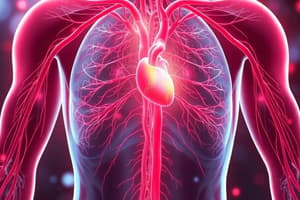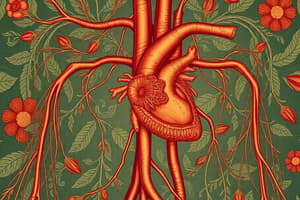Podcast
Questions and Answers
______ vessels carry blood from arterioles and small vessels called venules, which empty into veins.
______ vessels carry blood from arterioles and small vessels called venules, which empty into veins.
Capillaries
The oxygen-carrying protein in blood is called ______.
The oxygen-carrying protein in blood is called ______.
Hemoglobin
The clear fluid that fills the spaces around body cells is known as ______.
The clear fluid that fills the spaces around body cells is known as ______.
Lymph
Types of cells in the blood that cause blood clots to form are called ______.
Types of cells in the blood that cause blood clots to form are called ______.
Blood pressure is a measure of the amount of force that the blood places on the walls of blood vessels, particularly large arteries, as it is pumped through the body. It is important for maintaining proper ______ circulation.
Blood pressure is a measure of the amount of force that the blood places on the walls of blood vessels, particularly large arteries, as it is pumped through the body. It is important for maintaining proper ______ circulation.
A microorganism that causes disease is known as a ______.
A microorganism that causes disease is known as a ______.
Study Notes
Cardiovascular and Lymphatic Systems
Vocabulary
- Capillaries: small vessels that carry blood from arterioles and small vessels called venules, which empty into veins
- Hemoglobin: the oxygen-carrying protein in blood
- Plasma: the fluid in which other parts of the blood are suspended
- Platelets: types of cells in the blood that cause blood clots to form
- Blood pressure: a measure of the amount of force that the blood places on the walls of blood vessels, particularly large arteries, as it is pumped through the body
- Lymph: the clear fluid that fills the spaces around body cells
- Pathogen: a microorganism that causes disease
Cardiovascular System
- The main functions of the cardiovascular system are to:
- Transport oxygen and nutrients to cells
- Remove waste products from cells
- Regulate body temperature
- The three main components of the cardiovascular system are:
- Heart: pumps blood throughout the body
- Arteries: carry oxygenated blood away from the heart
- Veins: carry deoxygenated blood back to the heart
Lymphatic System
- The lymphatic system helps to:
- Defend the body against infection
- Remove waste products from the body
- Aid in the absorption of fats and fat-soluble vitamins
Maintaining a Healthy Circulatory System
- Behaviors that can help maintain a healthy circulatory system:
- Regular exercise
- Eating a healthy diet
- Not smoking
- Maintaining a healthy weight
- Managing stress
- Getting enough sleep
Cardiovascular Problems
- Causes of cardiovascular problems:
- High blood pressure
- High cholesterol
- Smoking
- Diabetes
- Obesity
- Six disorders of the cardiovascular system:
- Heart attack
- Stroke
- Atherosclerosis
- Hypertension
- Angina
- Cardiomyopathy
Studying That Suits You
Use AI to generate personalized quizzes and flashcards to suit your learning preferences.
Description
Test your knowledge of key terms related to the cardiovascular and lymphatic systems. Match definitions with terms like plasma, hemoglobin, platelets, and more.




